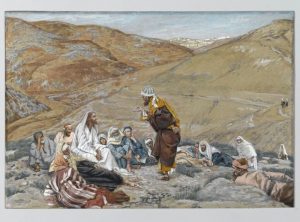Season of Creation: Pray Sunday
Thoughts on Sunday’s Lessons for Sept. 1, 2024 (Pentecost 15B/Proper 17)

The Scribe Stood to Tempt Jesus (c.1886-1894), watercolor over graphite on gray wove paper by James Tissot (1836-1902). Brooklyn Museum, New York. (Click image to enlarge.)
First Reading (Track One): Song of Solomon 2:8-13
Creation Focus: Love of God received through nature.
Our Track One first readings now turn to the Hebrew Bible’s wisdom literature – books of thoughts and advice on wise and proper living. We begin this Sunday with a love poem from the Song of Solomon, a deeply romantic book that tradition attributes to King Solomon himself (although they were actually written centuries later). These verses sing of deep love between a woman and a man who has returned to her after a cold winter, using charming metaphors of nature and the seasons like these familiar verses, “The flowers appear on the earth; the time of singing has come, and the voice of the turtle-dove is heard in our land. The fig tree puts forth its figs, the vines are in blossom; they give forth fragrance. Arise, my love, my fair one, and come away.
First Reading (Track Two): Deuteronomy 4:1-2, 6-9
Creation Focus: God’s rules are for living on the land.
Don’t do as we say. Do as we do. We hear this simple wisdom unveiled for us throughout Sunday’s readings. In our Track Two first reading last week, we looked on as an aging Joshua, facing the end of his life, called on the people to recommit to God’s covenant once they were established in the Promised Land. Now we page back to Deuteronomy to hear Moses in his last days, uttering a similar call to the people to renew their commitment to the law and teaching as they prepare to cross into the Promised Land. Moses assures the people that by passing God’s teaching down through the generations, they will earn the right to live in the land, and they will win the world’s respect for their wisdom and discernment.n the promised land, gaining the world’s respect for wisdom and discernment.
Psalm (Track One): Psalm 45:1-2, 7-10
Creation Focus: Beauty of creation as God’s anointing.
Following the Song of Solomon in the first reading, these snippets from Psalm 45 are framed as a love song, too, mustering metaphors of beautiful music and appealing scents. A noble song fashioned for a king on the occasion of his royal wedding, it praises the king as the fairest of men, from whose lips flow grace. Then the narrative turns to praise for God. Even above the king, God is the Holy One who has anointed and blessed the king with an enduring throne and a scepter of righteousness. God has anointed the king because God loves righteousness and hates iniquity, the psalm tells us. By carrying out God’s will, the monarch earns God’s blessings on earth.
Psalm (Track Two): Psalm 15
Creation Focus: The righteous as those who dwell on a holy mountain.
Mirroring the wisdom taught by Moses in the first reading, the Psalmist proclaims that those who live blamelessly and with righteousness and truth may earn God’s protection. The verses of Psalm 15 tell us how to do that: Be honest, be trustworthy, be fair; protect the innocent. Follow these ways, and you will abide upon God’s holy hill. Honesty, kindness, and love of neighbor all make a difference. The way we live matters to God.
Second Reading: James 1:17-27
Creation Focus: Creation is God’s good gift; look after it.
Tradition attributes the letter of James to the apostle identified as Jesus’s brother. Although the likely time of its writing late in the first century makes this appealing legend doubtful, the letter remains one of the New Testament’s strongest calls to the social gospel and the way that Jesus taught. In admonitions like “be doers of the word and not merely hearers who deceive themselves,” and, later in the letter, “faith without works is dead,” it urges the reader to reach out as Christ’s hands in the world, to be righteous, to care for widows and orphans in their distress.
Gospel: Mark 7:1-8, 14-15, 21-23
Creation Focus: Sustenance is God’s good gift for all.
Our six-week foray into Jesus’s extended dissertation on the bread of life in Chapter Six of John’s Gospel has come to its end, and we now return to Mark’s Gospel for the rest of this liturgical year. You might think for a moment that nothing has changed, though, as we once again find Jesus, now in Mark’s telling, jousting with a crowd of scribes and Pharisees. The law-abiding religious leaders challenged Jesus because they saw his disciples ignoring the strict ritual practice of washing before eating. In response, Jesus quotes the Prophet Isaiah, scorning those who honor God with their lips while their hearts are far away, thoughtlessly following ritual rather than living in the spirit of God’s laws. It is not eating that defiles us, Jesus proclaims, but the sins that come from our mouths and our hearts.
